#Maija Liuhto
Photo
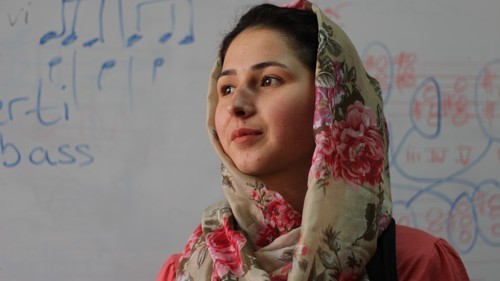
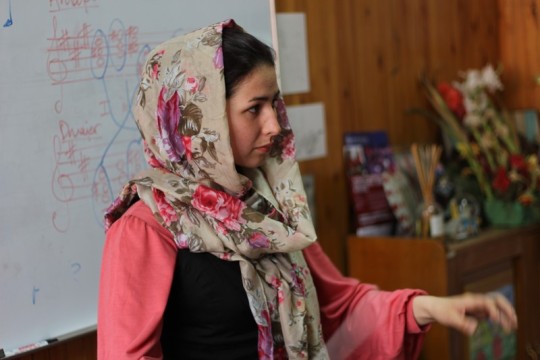
Facing Death Threats, Afghanistan’s First Female Conductor Plays On
By Maija Liuhto
16.6.17
At 12 years old, Negin Khpalwak decided she wanted to study music. Then, her uncles threatened to kill her.
Khpalwak, now 20, is from the restive Kunar province in Eastern Afghanistan. I meet her in a classroom in Kabul, where she sits behind a grand piano surrounded by young women and girls clutching violins, clarinets, and cellos. Khpalwak listens to Lauren Braithwaite, a woodwind teacher originally from the UK, as she leads a rehearsal session of Zohra, Afghanistan’s first women’s orchestra, which is a project of the Afghanistan National Institute of Music, or ANIM.
“Violins, I love you to death – but C is still not right,” Braithwaite says as the young women rehearse the section again.
Typically, Khpalwak stands in Braithwaite’s place, holding a baton in front of her classroom of women; she is the first female conductor in Afghanistan.
Last year, Khpalwak’s orchestra shot to fame after their debut international performance at the World Economic Forum in Davos, Switzerland. Like Khpalwak, many of the young women in her orchestra faced challenges just convincing their families to allow them to study and practice music—let alone travel abroad. But Braithwaite says the trip was a success. “The reception was overwhelming,” she remembers. “We had crowds of people wanting encores. They were coming right up to the stage. It was like we were a famous band.”
But all of this would have been unthinkable only 16 years ago. The Taliban, who ruled most of Afghanistan from 1996 until US invasion in 2001, strictly banned all forms of music, and women were not allowed to participate in activities outside of the home, including studying at schools or universities.
As a young girl, the thought of studying music had never crossed Khpalwak’s mind. “I had seen many female singers, but I’d never seen a woman play an instrument in Afghanistan,” she says.
Despite cultural and political shifts in Afghanistan since the end of Taliban rule, many still believe music to be against Islam—especially when it comes to female performers. When Khpalwak decided she wanted to join ANIM, she was fearful of her parents’ reaction, but it was actually her uncles who threatened her life. “[My uncles] were saying, ‘We will kill you. Wherever we see you, we will kill you,’” Khpalwak remembers. “They think girls should stay at home and that Muslims can’t play music.”
Luckily, however, Khpalwak spent the majority of her teenage years away from her uncles, as her family moved her to an orphanage in Kabul when she was nine years old so that she would be closer to opportunities for education.
The idea behind ANIM, which also provides a regular school curriculum for students, extends beyond reviving music in Afghanistan after the Taliban rule. “One of the objectives of the program is to rebuild and improve the lives of disadvantaged kids and to make a small contribution towards empowering girls and women through music and education,” explains Ahmad Sarmast, founder and director of AMIN.
When ANIM opened its doors in 2010, the majority of students came from orphanages or poor, rural families. “They come from far away provinces where there are no schools – even for boys,” says Sarmast. “That’s why many of these girls ended up in orphanages [in the capital]. Their families care for their future and education.”
“After joining ANIM, I didn’t go back home for a long time because my uncles created problems for me,” Khpalwak says. Today, she says her immediate family also lives in Kabul, due to threats from her uncles.
Braithwaite says this sort of sacrifice is not atypical for students at ANIM—and particularly the girls. “These students are sacrificing relationships, they’re going against their families, and they’re perhaps having to move away from their families to be able to do what they’re doing,” she says.
In 2014, students of ANIM were targeted by a suicide bomber while giving a performance at the French cultural center in Kabul, killing one and injuring several others. According to Sarmast, who was injured in the attack, there are still credible threats toward the institute.
But Khpalwak believes in leading by example, and she hopes one day of opening a national orchestra for Afghanistan. “If we are scared and sit at home, we can’t progress and we can’t open the door for others.”
#long post#afghanistan#women#youth#education#islam#Religion#Maija Liuhto#Negin Khpalwak#Zohra#orchestra#taliban
308 notes
·
View notes
Text
Before Sanna Marin Came Benazir Bhutto
Is having a female leader definitive proof that a country has reached gender equality?
By Maija Liuhto, December 26, 2019

Pakistanis elected 35-year-old Benazir Bhutto as their prime minister more than 30 years before 34-year-old Sanna Marin's ascent to power in Finland
On December 10, Finland's left-wing Social Democrats, who lead a five-party coalition government, picked 34-year-old Minister of Transport and Communications Sanna Marin as the country's new prime minister.
The decision made the relatively unknown politician an international celebrity overnight - after all it is not every day that a woman as young as Marin gets the chance to lead a country. Countless articles and news reports published and broadcast across the world celebrated her sudden rise to power as a "feminist victory" and praised Finland for its "progressiveness".
Marin's premiership has clearly been perceived by many in Finland and beyond as a manifestation of Nordic gender equality. But is Finland really that unique for having a young, female leader? And more importantly, is having a woman leader definitive proof that a country reached gender equality?
According to this measure, Pakistan, a country often branded "deeply conservative" and "patriarchal" and even considered one of the most dangerous in the world for women, for example, was seemingly as progressive as Finland over 30 years ago when Pakistanis elected a 35-year-old woman, Benazir Bhutto, as their prime minister.
Back then, Bhutto was not only the youngest prime minister in the world but also the first Muslim woman to hold a country's highest office. In contrast, Finland got its first and only female president a decade later in 2000 and the first female prime minister in 2003.
And Pakistan was not the only "conservative", predominantly Muslim nation to beat "progressive" Finland to electing a female head of state. Khaleda Zia became the first female prime minister of Bangladesh in 1991 and Tansu Ciller was elected Turkey's prime minister in 1993.
Other nations that are part of the global south, and that are similarly perceived in the West as "dangerous" or "hostile" to women, had female leaders even earlier. Sri Lanka's first female Prime Minister Sirimavo Bandaranaike was elected to office in 1960, while Indira Gandhi became India's prime minister in 1966.
Unlike Marin, whose ascent to power was widely seen as a consequence of her country's feminist values, Bhutto's tenure was seen as an anomaly.
As the daughter of former Prime Minister Zulfikar Ali Bhutto, Bhutto hailed from a political dynasty and was groomed from an early age for a career in politics. Her family's wealth and status allowed her to study at Harvard and Oxford.
After her father was hanged by military dictator Zia ul-Haq in 1979, she started to lead the struggle for the reinstatement of democracy in the country. But if not for her political family, elite status and the feudal nature of the Pakistani society, she may never have made it as far.
Bhutto undeniably faced additional obstacles during her two terms in office because of her gender and had to navigate pressure from conservative forces that did not want to submit to a woman's authority. But was Bhutto's election as prime minister a real victory for women in Pakistan? Did she use her status as leader to elevate and empower women in the country?

Former Prime Minister late Benazir Bhutto is being remembered on her 12th death anniversary today.
Not really, if we are to go by legislation enacted by her governments. Repressive laws from Zia ul-Haq's time remained untouched throughout Bhutto's tenure, much to women's rights groups' dismay. Moreover, she arguably contributed to the oppression of women in neighbouring Afghanistan by choosing to recognise the repressive, anti-women Taliban regime there.
Marin, on the other hand, comes from a working-class background. She managed to rise to the top because her country offers free, quality education to every child living there and has a political system (unlike Pakistan) where a lack of money and connections do not hinder one's chances of becoming prime minister.
Moreover, Finland has an excellent track record when it comes to women's presence in the workforce, access to education and political representation. Pakistan, on the other hand, remains abysmally low in these rankings.
None of this, however, means Finland is a feminist utopia and Pakistan is a dangerous country where women can never feel safe.
The situation in both countries is a lot more complex than that.
Despite all the stereotypes, not all sections of Pakistan's diverse society are hostile to women. There are pockets of liberalism in the society that are rarely seen in the West - the lifestyle of the educated elite is strikingly similar to the West and there are families even in the lower ranks of the society that believe in educating their daughters and giving them the freedom to control their own lives. Many Pakistani women are also breaking stereotypes by working in male-dominated professions such as the police.
These may be exceptions to the rule but the entire country should not be painted with the same brush.
Meanwhile, Finland's fight for gender equality is most certainly not complete and the country is not free of gendered oppression, violence and discrimination.
First of all, its political history is dominated by men - it was only in the late 1990s and early 2000s that the number of female ministers in the country started to slowly climb up from almost zero. And, earlier this year, the pregnancy of a female minister, Annika Saarikko, while in office in Finland became a hot topic of discussion.
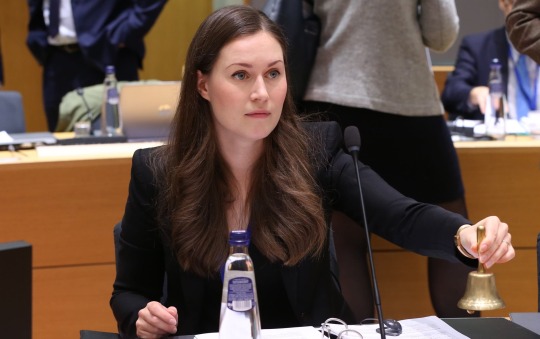
Even in a so-called progressive society such as Finland, some thought that her giving birth while in office would hinder her ability to carry out her duties. In Pakistan, Bhutto had a baby while in office back in 1990 without any significant controversy.
While Finland continues to be celebrated as some kind of paradise for women, the alarmingly high rates of rape and domestic violence in the country are often ignored. Nearly 50 percent of women and girls above the age of 15 have experienced physical or sexual violence, according to a recent report. In fact, a 2014 study found Finland to be the second-most violent country in the EU for women.
Moreover, Finland did not actually elect Marin as prime minister. She was selected for the post by her party following the resignation of Antti Rinne. Had there been an actual election in Finland, there would most probably now be an anti-feminist, nationalist government in power. Marin's Social Democrat Party would not have won as it did in April this year.
Much like everywhere else in the West, anti-immigration sentiment has been on the rise in Finland in recent years. The Islamophobia exhibited by such political forces usually goes hand-in-hand with opposition to feminism or even outright hatred of women. In the last parliamentary elections, the highest number of votes went to Jussi Halla-aho, leader of the Finns Party, which is known for its anti-immigration stance.
The party's youth wing has declared itself to be anti-feminist because it believes feminism is harmful to society, and Halla-aho himself has openly hoped that supporters of the green left would be targeted by rapists. His party is now the most popular one in Finland, according to recent polls.
This, perhaps more than Marin's premiership, should tell us something about the political climate in Finland. It is a patriarchal society in which more and more people there seem to think that feminism has gone "too far". But all of this somehow gets buried in the celebratory news coverage surrounding Marin.
Undoubtedly, during such times in Finland, Marin's premiership is symbolically important, given that she embodies almost everything parties like the Finns love to hate.
She is bound to face fierce opposition and it remains to be seen what her government's actual contributions to gender equality and anti-racism will be.
The symbolical importance of having young female politicians come to power deserves to be celebrated, but context matters. Having a woman lead a country does not automatically mean that women are faring well there.
Maija Liuhto is a Finnish journalist currently based in Islamabad, Pakistan.
The views expressed in this article are the author's own and do not necessarily reflect Al Jazeera's editorial stance.
— Al Jazeera English
0 notes
Text
The Reluctant Propagandist
Maija Liuhto | Longreads | August 2019 | 15 minutes (4149 words)
It’s 7 a.m. in Kabul. As usual, hundreds of thousands of cars are stuck in traffic jams around the city, where police checkpoints, Humvees, and blast walls congest the perilous streets. Taxi drivers in faded yellow Corollas roll up their windows and try to shoo off street children blowing heady incense — meant to ward off evil…
View On WordPress
0 notes
Text

I posted 1,507 times in 2021
514 posts created (34%)
993 posts reblogged (66%)
For every post I created, I reblogged 1.9 posts.
I added 542 tags in 2021
#mine - 110 posts
#pakistan - 84 posts
#music - 60 posts
#clothes - 57 posts
#art - 55 posts
#history - 41 posts
#national geographic - 40 posts
#food - 34 posts
#afghanistan - 33 posts
#movies - 28 posts
Longest Tag: 139 characters
#then when i taught them the reason for it - the fact that these women were being abused by their drunk husbands who were spending all thei
My Top Posts in 2021
#5

Lahore
187 notes • Posted 2021-05-03 23:46:42 GMT
#4

Karachi, 1960s
222 notes • Posted 2021-07-31 14:09:44 GMT
#3
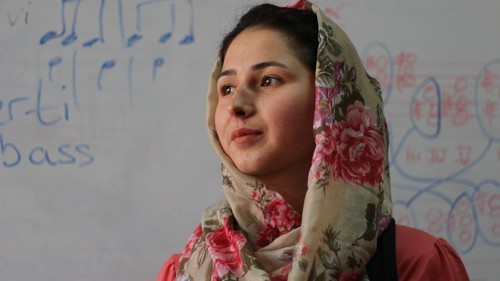
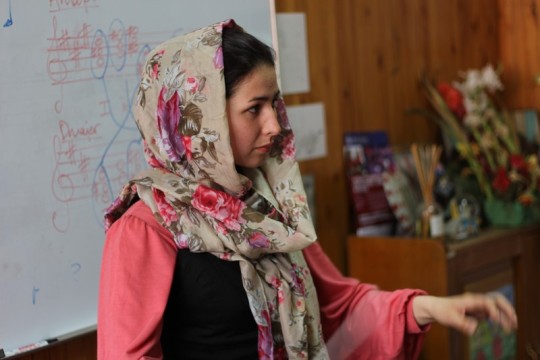
Facing Death Threats, Afghanistan’s First Female Conductor Plays On
By Maija Liuhto
16.6.17
At 12 years old, Negin Khpalwak decided she wanted to study music. Then, her uncles threatened to kill her.
Khpalwak, now 20, is from the restive Kunar province in Eastern Afghanistan. I meet her in a classroom in Kabul, where she sits behind a grand piano surrounded by young women and girls clutching violins, clarinets, and cellos. Khpalwak listens to Lauren Braithwaite, a woodwind teacher originally from the UK, as she leads a rehearsal session of Zohra, Afghanistan’s first women’s orchestra, which is a project of the Afghanistan National Institute of Music, or ANIM.
“Violins, I love you to death – but C is still not right,” Braithwaite says as the young women rehearse the section again.
Typically, Khpalwak stands in Braithwaite’s place, holding a baton in front of her classroom of women; she is the first female conductor in Afghanistan.
Last year, Khpalwak’s orchestra shot to fame after their debut international performance at the World Economic Forum in Davos, Switzerland. Like Khpalwak, many of the young women in her orchestra faced challenges just convincing their families to allow them to study and practice music—let alone travel abroad. But Braithwaite says the trip was a success. “The reception was overwhelming,” she remembers. “We had crowds of people wanting encores. They were coming right up to the stage. It was like we were a famous band.”
But all of this would have been unthinkable only 16 years ago. The Taliban, who ruled most of Afghanistan from 1996 until US invasion in 2001, strictly banned all forms of music, and women were not allowed to participate in activities outside of the home, including studying at schools or universities.
As a young girl, the thought of studying music had never crossed Khpalwak’s mind. “I had seen many female singers, but I’d never seen a woman play an instrument in Afghanistan,” she says.
Despite cultural and political shifts in Afghanistan since the end of Taliban rule, many still believe music to be against Islam—especially when it comes to female performers. When Khpalwak decided she wanted to join ANIM, she was fearful of her parents’ reaction, but it was actually her uncles who threatened her life. “[My uncles] were saying, ‘We will kill you. Wherever we see you, we will kill you,’” Khpalwak remembers. “They think girls should stay at home and that Muslims can’t play music.”
Luckily, however, Khpalwak spent the majority of her teenage years away from her uncles, as her family moved her to an orphanage in Kabul when she was nine years old so that she would be closer to opportunities for education.
The idea behind ANIM, which also provides a regular school curriculum for students, extends beyond reviving music in Afghanistan after the Taliban rule. “One of the objectives of the program is to rebuild and improve the lives of disadvantaged kids and to make a small contribution towards empowering girls and women through music and education,” explains Ahmad Sarmast, founder and director of AMIN.
When ANIM opened its doors in 2010, the majority of students came from orphanages or poor, rural families. “They come from far away provinces where there are no schools – even for boys,” says Sarmast. “That’s why many of these girls ended up in orphanages [in the capital]. Their families care for their future and education.”
“After joining ANIM, I didn’t go back home for a long time because my uncles created problems for me,” Khpalwak says. Today, she says her immediate family also lives in Kabul, due to threats from her uncles.
Braithwaite says this sort of sacrifice is not atypical for students at ANIM—and particularly the girls. “These students are sacrificing relationships, they’re going against their families, and they’re perhaps having to move away from their families to be able to do what they’re doing,” she says.
In 2014, students of ANIM were targeted by a suicide bomber while giving a performance at the French cultural center in Kabul, killing one and injuring several others. According to Sarmast, who was injured in the attack, there are still credible threats toward the institute.
But Khpalwak believes in leading by example, and she hopes one day of opening a national orchestra for Afghanistan. “If we are scared and sit at home, we can’t progress and we can’t open the door for others.”
283 notes • Posted 2021-08-17 04:02:04 GMT
#2

Kashmir, 1970s
326 notes • Posted 2021-09-09 09:35:10 GMT
#1
why is every brown and/or ex-Muslim person I find on this website a fucking terf I'm so sick of y'all
1242 notes • Posted 2021-08-03 18:19:58 GMT
Get your Tumblr 2021 Year in Review →
#my 2021 tumblr year in review#I'M SCREAMING AT MY NUMBER 1 POST#IT'S ONLY NUMBER 1 CUZ OF ALL THE TERFS LMFAOOOOO
4 notes
·
View notes